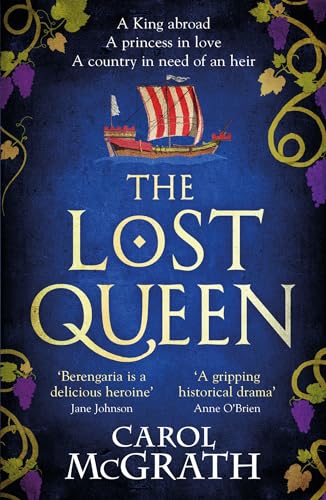The Lost Queen
1191. A third crusade is inexorable: King Richard of England (and Duke of much of France) takes up arms to win back Jerusalem, held by the Muslim Sultan Saladin, joining forces with most of the crowned heads of western Europe.
As he prepares, Richard’s spirited mother, Eleanor of Aquitaine, intent on preserving her dynasty, delivers him his future bride – not Alice of France, as many wished for political expediency, but regal, tenacious and duskily beautiful Princess Berengaria of Navarre. Enduring an arduous journey through the bitter, frozen Alps, and southern Europe to Messina, Sicily, with her virago of a chaperone, the fledgling princess finds only the rosy bloom of adventure on each new experience, brushing aside an attempt on her life foiled by her guard and finally wedding her heart’s desire in newly conquered Cyprus.
His star in the ascendant, Richard overlooks that his choice will fracture the leadership alliance of the crusade, underestimating the vengeful reckoning that will constantly resurface. An imagined character, Avelina of Middleton, also reaches the Holy Land in Berengaria’s entourage, disguised amongst a party of English nuns seeking a holy relic – hoping to find her missing husband alive in Saracen territory. This proves to be an inspired writing device: told chiefly through the worlds of Berengaria and Avelina, interleaved with the experiences of Blondel, a poet-musician-spy, and Sir William, Avelina’s long-lost soulmate. Carol McGrath’s elegant prose weaves a sumptuous tale of Templar knights and fine ladies, courtly love, exhilarating adventure and stalwart heroism as exquisitely crafted as a Pre-Raphaelite painting.
Berengaria emerges as intelligent and indefatigable, fighting to reconcile her dearly won agency with the complicated, tested and enduring devotion she cannot deny for her lord and king (if never with the contradiction inherent in holy war). Magical.










